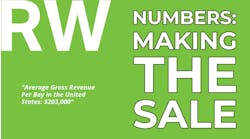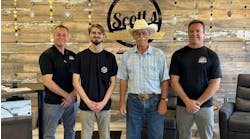Charlie Marcotte, owner of American Pride Automotive, held a steak dinner for one of his shops, when one of his service advisors came in with some news: His closing ratio broke 50 percent. That marked the first time one of Marcotte’s service advisors broke the 50 percent threshold.
“He was so excited because he has reached what we would call a pinnacle of sales,” Marcotte says.
Hitting that 50 percent closing ratio has been a goal for Marcotte and his staff at American Pride Automotive. However, Marcotte is firmly aware of the struggles service advisors can have in getting customers to commit to repairs.
Sales Slump? Training is Key
Preparation is important in any profession, and sales is no exception. Customers are often hesitant or distrustful when entering a shop; many service advisors have technician backgrounds and might struggle transitioning into their new roles and other service advisors may be asking the wrong questions.
Because of these challenges, Marcotte ensures his staff is well-trained and well-prepared to handle them. He routinely sends his staff to training with the Transformers Institute, and invests in the necessary tools for success in their day-to-day work.
Jason Servidio teaches sales and management training through the Transformers Institute, working with shops to improve their sales.
There’s an old adage that says 80 percent of sales is discovery. It’s an adage Servidio says rings true, outlining in his training that simply learning about the customer can be an overlooked step in improving sales. He believes shops operating under a relationship model are more successful and have better luck closing sales.
The Relationship Model
Servidio outlines two basic models in the automotive industry: a discount or transactional model and a relationship model. The primary selling point in the transactional model is that your shop’s services are cheaper than your competitors. A service advisor operating out of the discount model tells you what your car needs and how much it costs.
“They continue to lower the price until you say yes,” Servidio says, “and they usually don’t make a lot of money, and they don’t usually provide very good service for people.”
The shops that Servidio works with, and the ones he believes in, operate out of the relationship model. These are shops that care about their customers and hope to build trust before making their repair recommendations.
Opposed to the discount model where the shop boasts the lowest price or might continue to drop the price in the hopes their customer will cave, the goal in the relationship model is to sell by giving your best professional advice.
The tricky part is you need to build trust with the customer first, and there’s not a whole lot of time to do it.
“How can you expect someone to listen to you if they don’t know you?” he asks.
Asking the Right Questions
So, how, as a service advisor, do you get to know your customers? While it might seem simple enough, brief interactions while someone is bringing in their car or you’re attempting to conduct business aren’t the best forums for communication.
Building trust in such a short period of a time can prove challenging.
That’s why it’s important to ask the right questions. Servidio recommends asking consultant-style questions. When it comes to building trust, he says it’s the most important thing you can do.
“We don’t have a lot of time to create a great relationship with the customer. We want to do it as fast as possible,” he says. “Instead of just calling up and saying, ‘You need a…,’ and going through a list of stuff, (do some) consulting, asking questions.”
Those consultant-style questions look like: Do you like your car, or do you hate it? How long have you had your car? Do you have other cars? What other cars do you have? How do you use your car? Do you use your car primarily in city limits? Does anyone else drive the car? Do you drive the car in the snow or in the desert or in the mountains?
One of Servidio’s personal favorites is: Does your car ever have to be ready to leave town at a moment’s notice?
These types of questions provide insight into how your customer’s car is interwoven into their life. Once you have that information, you have more to base your recommendations on than simply: Here’s what’s wrong, and here’s what it’s going to cost.
“That frames everything we’re going to talk about being about you and what’s good for you, not your car… Asking some questions and then saying, ‘Based on what I know about you and how you feel about your car, I’ve changed the prioritization level of my recommendations a little bit for you,’” Servidio says. “That is the No. 1 way to increase your sales right there.”
Marcotte likes asking questions unrelated to customers’ vehicles. If the vehicle has out-of-state plates, that might spark a conversation. If the customer has an accent, maybe Marcotte asks where they're from. Who knows? Maybe he has some friends from the customer’s home state.
“There’s so many things to talk about, but until the person knows that you really care, they’re going to have objections to almost anything that you suggest,” he says.
Avoid the Technical
One common mistake many service advisors, particularly former technicians, make is getting too much into the weeds of the repairs. Technicians are often used to being valued for that technical expertise, but when it comes to making sales, too much industry lingo might just backfire.
“When you’re being over their head technical … they can’t really express it in words why they don’t like it, but they don’t like it,” Marcotte says. “When a technician transitions into a sales position, they often think that they have to beat the customer into submission with knowledge and that will build confidence. And really, it’s not.”
It all comes back to asking the right questions. Asking how long customers will need their cars to perform for, how long they want to keep their cars, and what their budget is and then base your recommendation on that. A recommendation that makes sense will go much further than overwhelming your customers with technical terminology they won’t understand.
“This job is not about the car, it’s about the person,” Servidio says. “You can be into cars—I love cars as much as anybody—but you need to really understand that your job is about people.”




